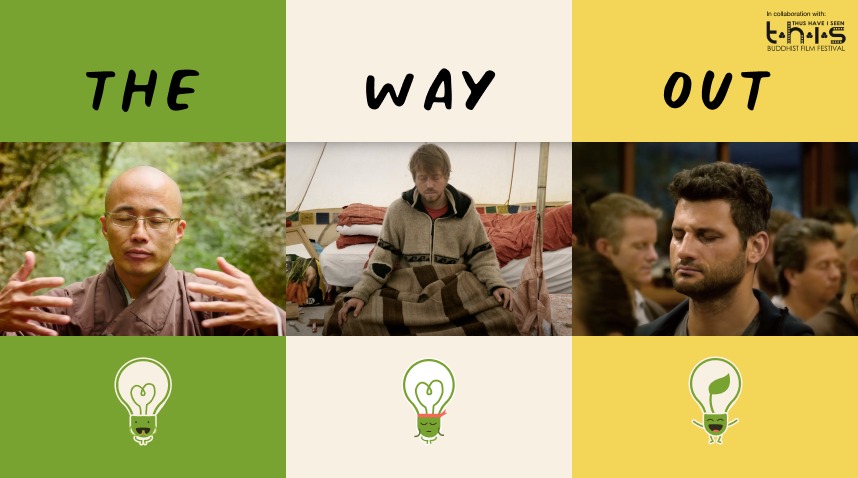Buddhist Film Reviews is a partnership series between HOL & THIS Buddhist Film Festival 2021 (25 Sept – 8 Oct’21). Themed “Open your mind”, THISBFF 2021 features 15 thought-provoking documentaries and feature films from 12 countries.
TLDR: The journeys of two young men searching for answers converge at Plum Village. It offers light in a world where we see escape as the only means to happiness.
It often feels that a day barely passes without the media talking about mental well-being or climate change as a subject that demands our attention. However, it is rare for a film to stir your attention and make you sit up to notice these issues.
Director Wouter Verhoeven’s heavy use of first-hand footage, interviews with protagonists and others brings into focus, the plight of Mother Nature and burnout in life.
Wouter masterfully uses mindful pauses in the film (shots of nature and the characters doing mundane activities) to create moments for reflection.
His main message is clear throughout the entire film: The way out of these crises starts when we look inwards.
The film, with momentary commentary by the Zen Master Thich Nhat Hanh, further enhances the impact of the film’s message.
The founder of Plum Village teaches, “The way out is in. The way out of climate change is inside each of us.” His invitation is to pause: to stop running and observe what is really going on.
The Way Out is Reflection
Wouter’s documentary focuses on two protagonists: Eddie, an environmental activist struggling to prevent fracking in Yorkshire, England; the other, a London banker facing an existential crisis. The banker, upon deeply examining his life, discovers its monotony and emptiness.
The film lays bare their attempts to remedy that despair in both their searches. Eddie searches for environmental protection while the banker searches for meaning.
As I watched the film, I was moved by the protagonists’ raw, unfiltered examination of their lives. The courage to confront their insecurities and uncertainty struck a chord within me. In a world where social validation of positivity is lauded, this film was a breath of fresh air.
For example, the banker realises that so many peers are depressed, in spite of their material success. He reflects that everyone is living in a fishbowl: one can look outside of the bowl but is incapable of experiencing the ocean outside (real world).
“There is a place for peace to reign, to settle, and you should go there. You know how to do it.” – Thich Nhat Hanh
“There is a place for peace to reign, to settle, and you should go there. You know how to do it.” – Thich Nhat Hanh
The Way Out is Harmony
What makes this film worth sitting up and paying attention to? For me, it was the Director’s elegant weaving of the two stories into one storyline. As I watched the film, I was trying hard to understand how the two protagonists’ stories would meet. Hint: Plum Village is the centre stage.
Within the film, harmony is achieved by the director’s thoughtful mix of tense scenes of confrontations with still nature shots and interviews with a Plum Village monastic.
The monk speaks to Eddie about his confrontations with the fracking industry and how Eddie feels about it.
“Don’t make a front, make a circle, there is no one to fight. We suffer because we don’t know better,” the Buddhist monk counsels Eddie as he faces burnout over his cause.
Nuggets of wisdom like this sprinkled throughout the film makes it a compelling watch. The film is not alarmist but rather, awakening.
The Way Out is Change
The most beautiful part of the film is watching how these two protagonists transform their mental states, especially after they come into contact with Plum Village, a Zen monastery in France. Seeing their calm faces while meditating, and their serene smiles while doing temple chores brought a smile to my face.
Eddie’s calm focus while making bread for fellow practitioners and the banker’s gaze while being in the monastery garden were my favourite scenes of inner change for these two characters.
Seeing Eddie and the banker find the strength to feel comfortable in their own skin and at peace was a relief. It was akin to witnessing a fish finding its way out of the fishbowl into the greater ocean. Change can be painful but necessary.
Change enables to let go of superficial & lesser happiness for the greater & deeper happiness in life.
Who do I Recommend the Film for?
Friends who find themselves stuck in the grind of the 9-to-5 or those feeling burnout from championing causes close to their hearts.
This film speaks directly to you and is unafraid to show you the costs of your ideals. It is a great introduction for those new to Buddhism as the film gives a taste of how Dhamma can be applied in real-world situations. How do we approach people who are in direct conflict with our values? How do we face an existential crisis? The film is a perfect illustration of Buddhism in action without requiring deep Buddhist knowledge.
You will be challenged to stop running and to take a pause. To find a mindful and peaceful way out.
A positive post-note to the film: In 2019, the UK government halted fracking in England. This effectively bans fracking in the UK, a watershed moment for activists and the environment. Scientific studies warned it was not possible to rule out unacceptable consequences for those living near fracking sites.


